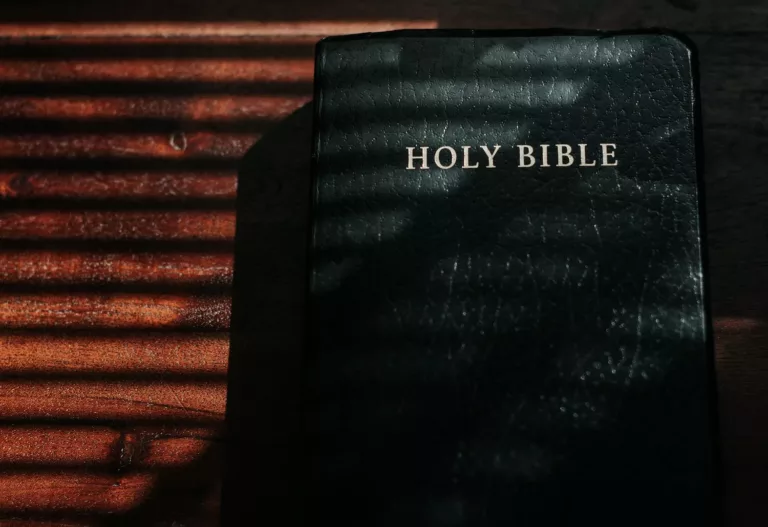Reading the book of Revelation can help us understand God’s message of salvation, but it can leave believers with a lot of questions about the end times, when Jesus will return. This is part one of a three-part series to help you understand the end times. This week, we start by looking at the big story of the Bible. Next week, we’ll look at what the whole Bible says about the end times. Then, we’ll look at what Jesus says about the end times.
Several years ago, a barista asked me about my weekly meeting at her coffee shop. I said, “It’s a Bible study.” She said, excitedly, “I’m very interested in the Bible – especially Revelation!” She went on to explain that she belonged to a group that spent all their time analyzing Revelation for signs of “the coming apocalypse”. I asked if she studied other parts of the Bible – the answer was a clear “No”. I would have liked to ask more questions, but customers were lining up, beginning to threaten a more immediate (if smaller scale) apocalypse of their own.
That conversation gave me insight into our biggest dilemma when it comes to “the end times”: not that they’re coming, but that we think about them in isolation from the rest of the Bible. The Bible is one big story told through historical accounts, poems, ethical codes, wisdom instruction, and prophetic vision. Like all stories, the Bible moves through a narrative progression. And like all stories, the Bible has a beginning and end.
The Big Story of the Bible
The Bible consists of four movements: Creation; Fall; Redemption; and New Creation. It begins with a single, all-powerful, all-knowing God creating heaven, earth and all living things with intentionality and purpose. At the center of creation God placed human beings, his image-bearers and intimate partners. Unique among creatures, God gave human beings free will: the capacity either to embrace, or reject God and God’s purposes. When the first human beings chose to reject God, they broke their connection to God’s love and eternal life. They also introduced corruption and chaos into all of life. God’s good creation went bad. God, however, did not abandon his handiwork. He instead initiated a plan of redemption. This plan started with reconciling fallen humanity to himself through Jesus. It will resolve with the restoration of all things.
A History-Long Conflict
An inescapable part of this plan is the resolution of a history-long conflict between good and evil. The active agent in humanity’s downfall is the “serpent” (identified in Revelation 12 as “the devil”, or Satan). Satan and his spiritual forces of evil are devoted to desecrating everything God made. As is evident in such chapters as Job 1, Romans 16, and Revelation 20, Satan and his forces, though formidable, are no match for God and his angels. The one place the spiritual forces of evil have any true power is human hearts. Humans still have a choice: good or evil, God’s way or ours. As such, there are humans who play into Satan’s schemes and serve evil purposes.
God’s promise is that the machinations of evil are limited and finite. There will be a final reckoning (Rev. 20:7-15). As this reckoning draws near, the human and spiritual forces of evil will fight to retain control over what the Lord calls “the old order” (Rev. 21:4). The end of human history will involve both visible (and violent) resistance to Christ’s kingdom, and the inexorable dying away of the first heaven and earth. Hence the often disturbing “apocalyptic” imagery found in books like Daniel and Revelation.
Courage and Comfort
But Christians can always look forward to the end of history with courage and comfort. When we consider the end times within the scope of all Scripture, we find these reassurances:
- There is “no condemnation” coming for all who belong to Jesus (Rom. 8:1).
- What is, for the wicked, a final reckoning is, for the redeemed, a great reunion (1 Cor. 13:12; Rev. 7:9-10).
- The more chaotic our world seems, the closer we are to this great reunion (Rev. 22:12-13).
- Christ preserves his own through any and all trials (Col. 3:3).
- The true battle has already been won, and our life in Christ is an anticipatory celebration of his victory (1 Cor. 15:26-27).
Our greatest source of comfort as we explore the Bible’s treatment of the end times is that we know how our story ends: not with confusion, chaos and defeat, but with resurrection, victory and new creation. Equipped with this knowledge, as the Heidelberg Catechism puts it,
We can be patient when things go against us, thankful when things go well, and for the future we can have good confidence in our faithful God and Father that nothing in creation will separate us from his love. (Heidelberg Catechism, Answer 28)
Ben Van Arragon is a preacher and writer based in Grand Rapids, Michigan. He preaches and teaches the Bible in church, online, and anywhere else he has the opportunity.
- Ben Van Arragonhttps://www.woh.org/author/ben-van-arragon/
- Ben Van Arragonhttps://www.woh.org/author/ben-van-arragon/
- Ben Van Arragonhttps://www.woh.org/author/ben-van-arragon/
- Ben Van Arragonhttps://www.woh.org/author/ben-van-arragon/


